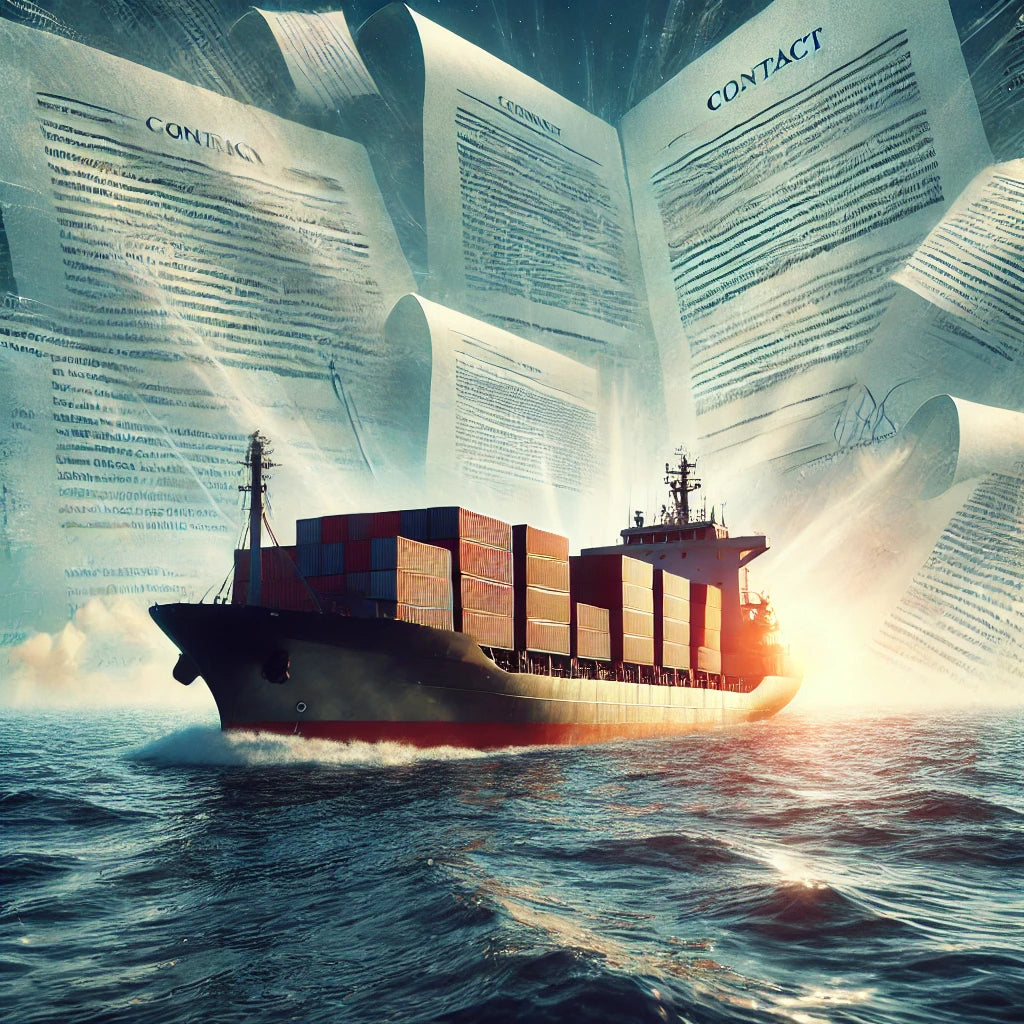
Understanding Contract and Affreightment Litigation
Introduction to Contract and Affreightment
What Is a Contract of Affreightment?
A Contract of Affreightment (COA) is a legal agreement between a shipowner and a charterer where the shipowner agrees to carry a specific quantity of cargo over a set period of time. These contracts are crucial in the shipping industry, governing the terms under which cargo is transported by sea. The contract typically outlines the obligations of both parties, including the quantity of cargo, the number of shipments, delivery timelines, and the freight charges.
Importance of Contracts in the Shipping Industry
Contracts of affreightment play a vital role in ensuring that international trade runs smoothly. They provide a clear framework for the transportation of goods, helping to prevent disputes by defining the responsibilities and expectations of all parties involved. Without such contracts, the complexities of maritime logistics could easily lead to misunderstandings, financial losses, and legal conflicts.
Overview of Affreightment Litigation
Affreightment litigation refers to legal disputes that arise from breaches or disagreements related to contracts of affreightment. These disputes can involve various issues, such as non-performance, delays, cargo damage, or disagreements over freight charges. When such disputes cannot be resolved through negotiation or arbitration, they often end up in court, where a judge will interpret the contract and decide on the appropriate remedy.
Common Issues Leading to Affreightment Litigation
Breach of Contract
Breach of contract is one of the most common reasons for affreightment litigation. This occurs when one party fails to fulfill their obligations as specified in the contract. For example, if a shipowner fails to provide the agreed-upon vessel or if the charterer does not provide the cargo as scheduled, the aggrieved party may seek legal action for damages caused by the breach.
Cargo Damage and Loss
Another frequent cause of disputes is cargo damage or loss during transit. In such cases, the shipowner or carrier may be held liable if the damage was due to their negligence or failure to ensure the cargo’s safe transport. Determining liability can be complex, often involving detailed examination of the contract terms, bills of lading, and the circumstances surrounding the shipment.
Delay in Delivery
Delays in cargo delivery can have significant financial implications, leading to disputes between the shipowner and the charterer. These disputes may arise if the delay causes the charterer to miss critical deadlines, resulting in lost revenue or penalties. The terms of the contract, including any specified delivery timelines and allowable delays, play a key role in determining the outcome of such litigation.
Disputes Over Freight Charges
Disagreements over the calculation and payment of freight charges are also common in affreightment litigation. These disputes can arise from unclear contract terms, additional costs incurred during transit, or changes in the shipment volume. Resolving these disputes typically involves a detailed review of the contract and supporting documentation to determine the correct amount owed.
Legal Framework Governing Affreightment Contracts
International Conventions and Laws
Affreightment contracts are governed by a complex legal framework that includes international conventions, national laws, and maritime regulations. Key conventions, such as the Hague-Visby Rules and the Rotterdam Rules, provide standard terms for contracts of carriage and outline the rights and responsibilities of carriers and shippers. These laws are designed to facilitate international trade by providing a consistent legal framework across different jurisdictions.
Key Clauses in Affreightment Contracts
Certain clauses are critical in affreightment contracts and play a central role in litigation. These include:
- Force Majeure Clauses: Protect parties from liability due to unforeseen events beyond their control, such as natural disasters.
- Demurrage Clauses: Specify penalties for delays in loading or unloading cargo beyond the agreed time.
- Arbitration Clauses: Outline the process for resolving disputes outside of court, often mandating arbitration as the first step.
The Role of Admiralty Law
Admiralty law, also known as maritime law, governs legal disputes related to maritime activities, including contracts of affreightment. Admiralty courts have specialized knowledge in handling these disputes, applying principles of maritime law to resolve issues related to vessel operations, cargo claims, and contractual obligations.
Steps in Affreightment Litigation
Filing a Lawsuit
The first step in affreightment litigation is filing a lawsuit. The party initiating the lawsuit, known as the plaintiff, must file a complaint detailing the breach or dispute, along with the relief sought, which could include damages or specific performance. The defendant, usually the party alleged to have breached the contract, will then have the opportunity to respond to the complaint.
Pre-Trial Procedures
Before the case goes to trial, both parties engage in pre-trial procedures, including discovery, where they exchange evidence and gather information to support their claims. This phase may also involve depositions, where witnesses provide sworn testimony. Pre-trial motions may be filed to resolve certain issues before trial, such as motions to dismiss the case or motions for summary judgment.
Trial and Judgment
If the case proceeds to trial, both parties will present their evidence and arguments before a judge or jury. The trial process involves examining witnesses, presenting documents, and making legal arguments. After both sides have presented their case, the judge or jury will render a judgment, which may include financial compensation or orders for specific performance.
Appeals and Enforcement
Following the trial, the losing party may choose to appeal the decision, seeking a higher court’s review of the case. Appeals focus on whether legal errors were made during the trial that could have affected the outcome. If the judgment is upheld, the winning party may take steps to enforce the judgment, such as seizing assets or placing liens on property.
How to Avoid Affreightment Disputes
Clear Contract Terms
One of the most effective ways to avoid disputes is to ensure that the contract of affreightment is clear, detailed, and unambiguous. All key terms, including payment schedules, delivery timelines, and liability for damages, should be explicitly stated to prevent misunderstandings.
Effective Communication Between Parties
Maintaining open and effective communication between all parties involved in the shipping process can help prevent disputes from arising. Regular updates, clear documentation, and prompt responses to inquiries can mitigate potential conflicts before they escalate.
Proper Documentation and Record-Keeping
Proper documentation and record-keeping are essential in avoiding and resolving disputes. This includes maintaining accurate records of shipments, payments, communications, and any incidents that occur during transit. These records can serve as crucial evidence in the event of a dispute.
The Role of Arbitration in Affreightment Disputes
Benefits of Arbitration
Arbitration offers several advantages over traditional litigation, including faster resolution times, lower costs, and the ability to select an arbitrator with specific expertise in maritime law. It is also a confidential process, which can be beneficial for companies wishing to avoid public disputes.
Arbitration Process in Shipping Disputes
In arbitration, both parties present their case to a neutral arbitrator, who then makes a binding decision. The process is less formal than court proceedings and is designed to be efficient and cost-effective. Many affreightment contracts include arbitration clauses, requiring disputes to be resolved through arbitration before any court action can be taken.
Choosing Arbitration vs. Litigation
The choice between arbitration and litigation depends on several factors, including the complexity of the dispute, the desired timeline for resolution, and the parties’ preference for confidentiality. Arbitration is often preferred for its efficiency, while litigation may be necessary for more complex or high-stakes disputes.
Case Studies: Common Scenarios in Affreightment Litigation
Case Study 1: Breach of Contract Due to Delayed Delivery
In this case, a charterer filed a lawsuit against a shipowner for failing to deliver cargo within the agreed timeline, causing significant financial losses. The court ruled in favor of the charterer, awarding damages based on the contract’s liquidated damages clause.
Case Study 2: Dispute Over Freight Charges
A dispute arose between a shipowner and a charterer over additional freight charges incurred due to unforeseen delays. The case was resolved through arbitration, with the arbitrator determining that the charterer was responsible for the additional costs based on the contract’s demurrage clause.
Case Study 3: Cargo Damage and Liability Issues
This case involved a claim for damages after cargo was spoiled during transit due to improper storage. The shipowner argued that the charterer had provided incorrect storage instructions, while the charterer claimed the shipowner was negligent. The court found the shipowner liable for the damages, emphasizing the importance of adhering to proper storage protocols.
The Role of Legal Counsel in Affreightment Litigation
When to Seek Legal Advice
Legal advice should be sought as soon as a dispute arises, or even earlier, when negotiating the terms of the contract. An experienced maritime lawyer can help navigate the complexities of affreightment contracts and ensure that your rights are protected.
How Lawyers Assist in Dispute Resolution
Lawyers play a crucial role in affreightment litigation by providing expert advice, drafting legal documents, representing clients in court or arbitration, and negotiating settlements. Their expertise in maritime law and familiarity with industry practices can significantly influence the outcome of a dispute.
Costs and Considerations of Legal Action
The costs of legal action can be significant, particularly in complex or protracted disputes. These costs include attorney fees, court costs, and any potential damages awarded. It’s important to weigh these costs against the potential benefits of litigation or arbitration, and to consider alternative dispute resolution methods when appropriate.
Conclusion: Navigating Contract and Affreightment Litigation Successfully
Contract and affreightment litigation is a complex area of maritime law, involving detailed contracts, international regulations, and specialized legal principles. By understanding the common causes of disputes, the legal framework, and the steps involved in litigation, parties can better navigate these challenges. Whether through clear contracts, effective communication, or seeking expert legal counsel, taking proactive steps can help avoid disputes and resolve them effectively when they arise.

